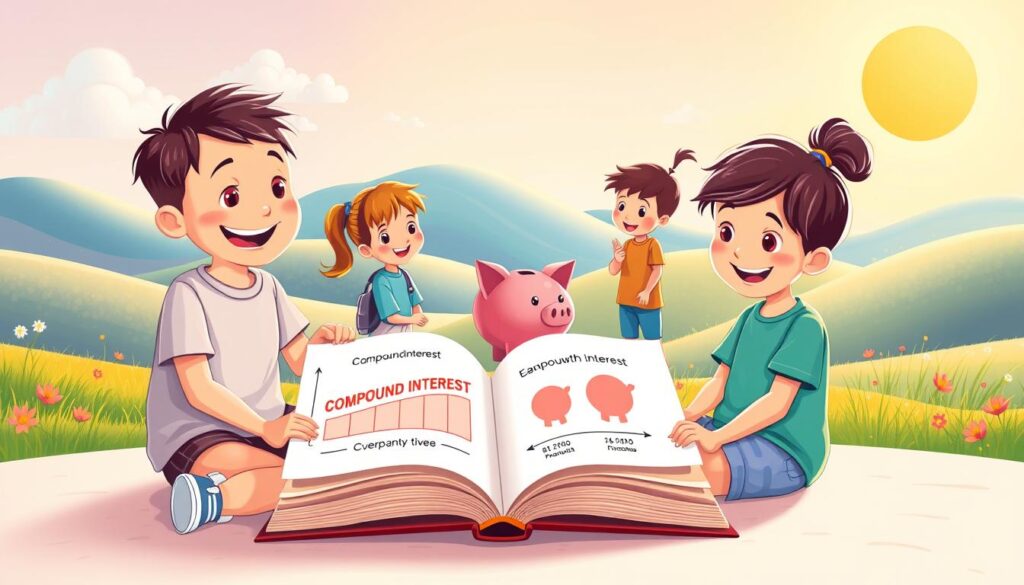Hey there, fellow kids! Ever feel like money talk is a secret club? I did too. Words like ‘interest,’ ‘assets,’ and ‘investing’ can seem hard to understand. But learning them can be really fun and useful.
Getting to know money terms is like having a superpower. It helps you make smart money choices. Financial literacy for kids is key for success later on. Knowing what ‘interest’ is can make your money grow.
Being good at a game makes you feel confident. It’s the same with money. Knowing about ‘assets for kids’ and ‘investing explained simply’ makes you feel in charge of your money future.
Why Money Has Its Own Secret Language
The world of finance is full of terms that sound like a secret code. John Lanchester says the finance vocabulary is a big barrier. Terms like “quantitative easing” can confuse people.
This makes finance seem like an exclusive club. Only those who get the jargon are in. Financial jargon can be scary. It’s not just the big words; it’s how they make you feel left out.

When pros use terms without explaining them, it feels like they’re speaking a different language. This can be scary for kids who are just learning about money.
“Quantitative easing” might sound like nonsense to many. But, it’s a tool used by central banks. Making these terms simple can help everyone understand finance better.
Getting these terms can make you feel more sure about money choices. By making the secret language of finance easier, we can help everyone get it.
It’s about making complex terms simple. Then, finance won’t be scary. It can help us make smart choices.
What Does Interest, Assets, and Investing Mean in Kids Terms
Ever wondered about interest, assets, and investing? These money ideas might seem hard, but they’re easy once you get it.
Simple Interest: When Your Money Gets a Friend
Simple interest means you earn money from your saved or invested cash. It’s like having a buddy that makes your money grow. For instance, if you save $100 at 2% simple interest, you’ll have $102 in a year.
Want to know more about interest? Check out this guide for parents and kids. It’s fun and easy to understand.
Compound Interest: When Your Money Makes Friends That Make More Friends
Compound interest is even more amazing. It’s when the interest you earn also earns more interest. This makes your money grow really fast over time. Albert Einstein thought it was so cool, he called it the “eighth wonder of the world”.

An asset is something valuable that helps you reach your goals. For kids, assets can be:
- Piggy banks or savings accounts
- Investments, like stocks or bonds
- Valuables, like a bike or a favorite toy
These assets help you buy what you want or save for later.
Why Waiting Helps Your Money Grow Bigger
Investing means using your money to buy something that might grow in value. It’s like planting a seed and waiting for it to grow into a tree. The longer you wait, the bigger it gets. That’s why patience is key when investing.
Learning these simple ideas helps you build a strong financial future.
More Money Words Every Kid Should Know
There are many important money terms kids should know. Learning these can help them make smart money choices. This sets them up for a secure financial future.
Securitization is a big term. It means mixing different debts into one thing investors can buy or sell. It’s like making a new recipe with different ingredients. But, it’s important to know it can make things unclear.
Money management also includes credit and debt. Credit lets you borrow money or use things without paying right away. Debt is money you borrow that you have to pay back, often with extra charges.
Here are a few more important terms:
- Assets: Things you own that have value, like money, property, or investments.
- Liabilities: Debts or amounts you owe to others.
- Net Worth: The difference between your assets and liabilities, showing your financial health.
Knowing these terms is key to financial literacy. It helps kids develop good money habits. It’s not just about knowing words; it’s about understanding the ideas behind them.
As kids learn more about money, they’ll feel more confident. This knowledge lets them make smart choices about saving, spending, and investing. It helps them succeed financially in the long run.
Fun Ways I Use These Money Words in Real Life
I use money words like ‘interest,’ ‘assets,’ and ‘investing’ every day. They help me make smart choices. Whether I’m saving for a bike or talking about money with friends, knowing these terms is key.
Understanding interest is easy. When I save in a bank, I earn interest. This makes my money grow. It’s a simple way to save more.
Assets are important too. They’re not just money. They can be things like a bike or savings. Knowing what I own helps me see my financial health. For example, if I have a $100 bike and $200 in savings, I have $300 total.
Investing is another big idea. It means making my money work for me. By investing in stocks or bonds, I buy a piece of a company or lend money. This teaches me patience and the chance for growth.
Here are more ways I use these money words:
- I talk about financial news with my family. We see how it affects our money.
- I think carefully about spending and saving. Every dollar can earn interest or be invested wisely.
- I set financial goals. Whether it’s for something I want now or later, I track my progress.
Learning about money teaches me responsibility and patience. It’s a skill for life. I’m excited to keep learning and growing.
Conclusion: You’re Now a Money Language Expert!
Learning the secret language of money is very powerful. It boosts your financial confidence. You now know important words like ‘interest,’ ‘assets,’ and ‘investing.’
This knowledge helps you make smart money choices. It’s the first step to becoming a money expert. You’re on your way to reaching your financial goals.
Kids need to know about money today. Financial choices affect us and our community. By learning more about finance, you’ll make better money decisions.
Keep learning about money to stay ahead. Being smart with money is a lifelong journey. You’re now ready to make a positive change in your financial life.